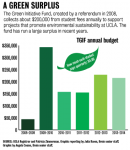Students will vote on a referendum this week that would indefinitely extend a $4.80 quarterly student fee used to fund campus sustainability projects.
Mandatory students fees for The Green Initiative Fund, or TGIF, have raised about $200,000 per year since it was created in 2008, according to the fund’s website. Over the years, the fund has doled out more than a million dollars to various projects.
In the 2013-2014 school year, the fund allocated about $215,200 to sustainability projects. Allocations also went to 74 projects last year, said Patty Zimmerman, TGIF grant coordinator.
Despite the dozens of allocations, the fund ran a surplus last year of more than $100,000, said Carlos Quintanilla, Undergraduate Students Association Council Facilities commissioner. Quintanilla sits on a TGIF allocations committee and pushed for the referendum to be on the special election ballot.
For now, mandatory student fees for TGIF are set to end in 2018.
The fee has funded various sustainability projects, including solar panel installations on the roof of Ackerman Student Union and an Ecochella music festival powered by bicycles in spring 2013 and 2014.
Quintanilla said he wanted to place the referendum on this week’s ballot because there are not as many candidates in the race, which could draw more focus to ballot measures.
“I imagined (the fund) would get more attention during a special election than spring election,” Quintanilla said.
Quintanilla added that he thinks having the TGIF referendum on the special election will allow students and faculty to see the monetary allocations available to them this fall for sustainability projects.
“I think it’s important because it allows students to create tangible (projects),” Quintanilla said. “Students get to have an impact on their university, if they have an idea in regards to sustainability.”
Though the referendum would extend a mandatory student fee, some students said they think it is a small price to pay for larger sustainability opportunities.
Jill Gaines, a first-year psychobiology student, said she supports the referendum because she thinks large campuses such as UCLA can serve as a model for the greater California community in sustainability efforts.
“Four dollars is not much for anyone, and UCLA is a big figure in California,” Gaines said. “It’s our role as citizens (to improve sustainability), and I hope that a lot of us are starting to recognize our role.”
To receive funding for sustainability projects this fall, students, staff or faculty must send applications by 5 p.m. on Oct. 31 to the fund’s email, TGIF@asucla.ucla.edu.
